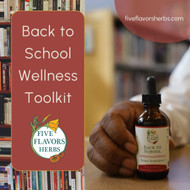Welcome Back to School!
Late summer brings a shift in seasons, immune function, and moods... plus it's when many of us go back to school or work. Heading back indoors, we share more germs, get less sunlight, and have more "to do's" on our plates. In addition to preparing our wardrobes and backpacks, now is the perfect time to support our minds & bodies with botanical allies to survive and thrive at work, school, and beyond.
By learning about herbal “action types,” we can employ flexible strategies to employ the herbs we have in our bioregion, our pantry, our garden, or on the shelves of a local health food store! While each individual herb has its own biochemistry and history of traditional use, general categories of herbs can benefit the body in unique ways, and by trying out herbs in these categories, you gain a chance to learn through experience the specific qualities of each herb in YOUR body.
In this blog, we will discuss herbs that are generally gentle and safe for most humans, including kids. Some herbs or formulas may not be appropriate for all people, especially pregnant or breastfeeding folks, or those taking prescription medications. When in doubt, always check with a qualified healthcare practitioner! Also, remember that raw honey is not safe for babies under 1 year (due to risk of botulism), and many kids don’t tolerate alcohol-based tinctures. Teas, powders, glycerites, oxymels, and washes are alternatives to tinctures you may wish to try.
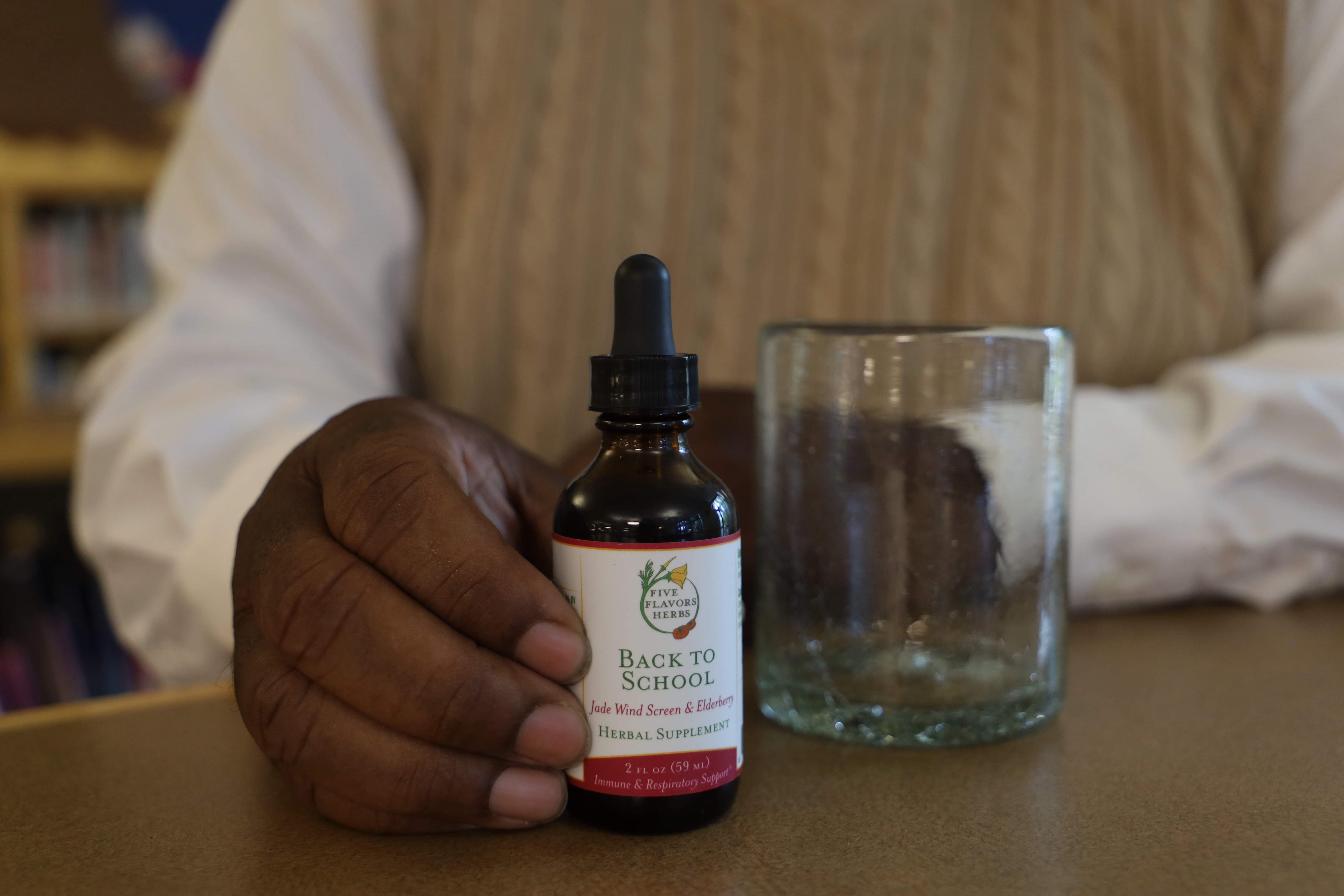
1. PROTECT
According to many East Asian healing traditions, late summer is the most important time of year to start building our immune defenses. Starting when the weather is still warm and before many seasonal bugs start to circulate can help prime the immune system to respond effectively to external threats. Some herbs traditionally used before the onset of illness to support wellness include:
- Medicinal mushrooms like reishi, turkey tail and shiitake contain a host of compounds–especially polysaccharides and beta glucans– that modulate the immune response for short- and long-term benefits
- Astragalus, Atractylodes and Siler are combined to create the traditional formula Jade Wind Screen (Yu Ping Feng San) for pre-season immune benefits
- Elderberries have been consumed across Europe and North America for centuries, including in jams, pies, and elixirs, for their immune-supporting and antioxidant properties.
What if you’re starting to come down with something? A slight stuffy nose, sore throat, or feeling more tired, are good signals to kick off a self-care campaign! In TCM, many of the tonic immune herbs listed above are not recommended once you start to have symptoms, so we don’t recommend astragalus tea in these moments. Single Western herbs such as echinacea, as well as other lymphatic herbs such as spilanthes and red root, support a rapid response when symptoms do start to arise. Aromatic and spicy herbs like peppermint, ginger and cinnamon can help “release the exterior” and push out pathogens, according to TCM. In addition to taking herbs, make sure to rest, eat light, simple foods, and keep to yourself (as much as possible!) until you’re through the woods.
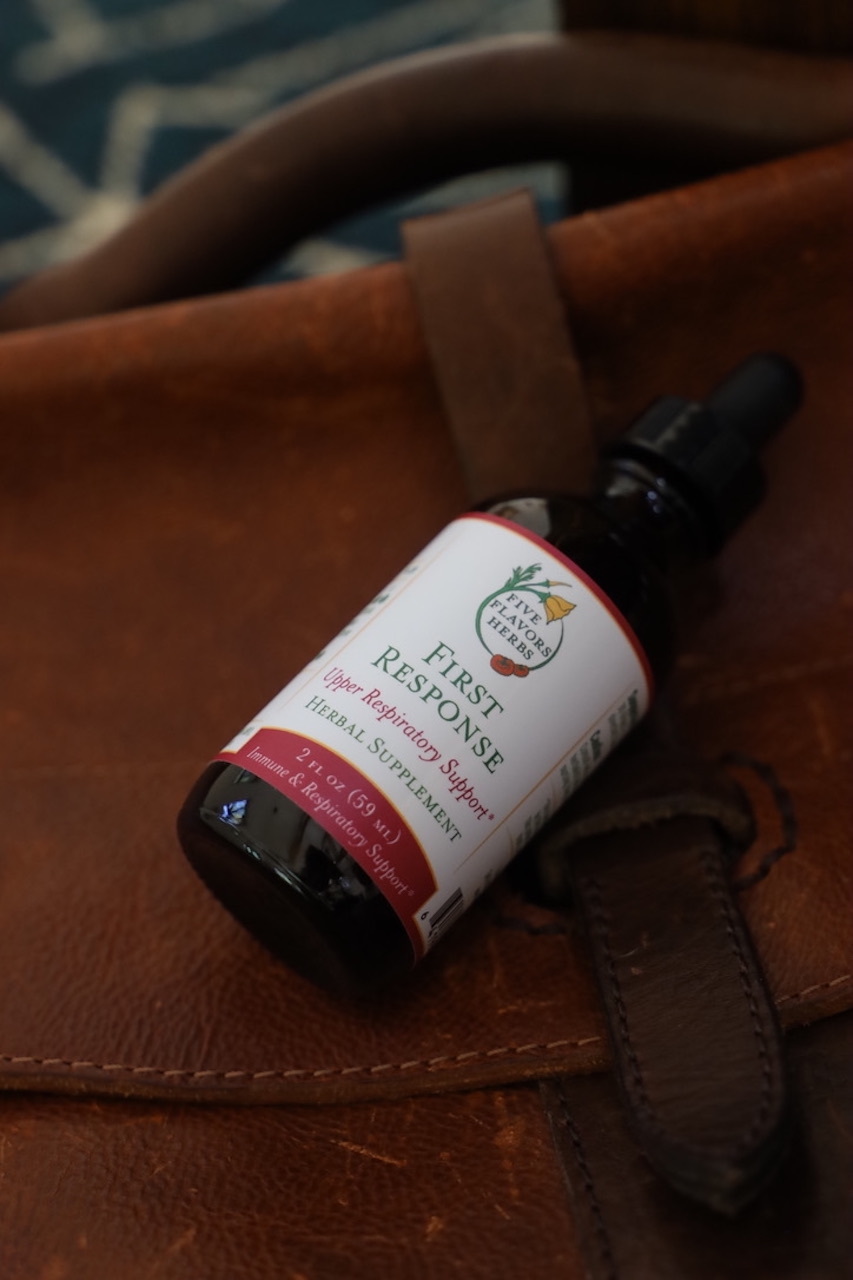
2. BUILD
Tonic herbs, including TCM herbs that supplement qi and blood, as well as adaptogens, can be consumed in the long term to help build vital energy in the body, sharpen the mind, and adapt to stressors. Think of these herbs like organic compost for a plant, supporting its growth and resilience. Some of our favorite supplementing herbs include:
- Ginseng: In TCM, ginseng is associated with the flavor sweet and with a slightly warm temperature. It builds the source qi, supports the Spleen, Lung, and Heart, nourishes the blood, and also calms the mind.
- Eleuthero: One of the original adaptogens researched heavily by Soviets starting in the 1940s, and also used in TCM, eleuthero is best known for helping to build physical stamina, supporting a healthy immune response, and for cognitive benefits. Formerly known as Siberian Ginseng, Eleuthero species are distant cousins from the Panax species.
- Rhodiola: The rhizomes of this sturdy, high-elevation plant support a healthy mood and are being researched for supporting overall longevity.
- Ashwagandha: Ashwagandha supports our ability to relax and let go of worry so that we can get natural, recuperative rest and wake up refreshed. Ashwagandha may also help with sexual function, memory, and a healthy response to inflammation.
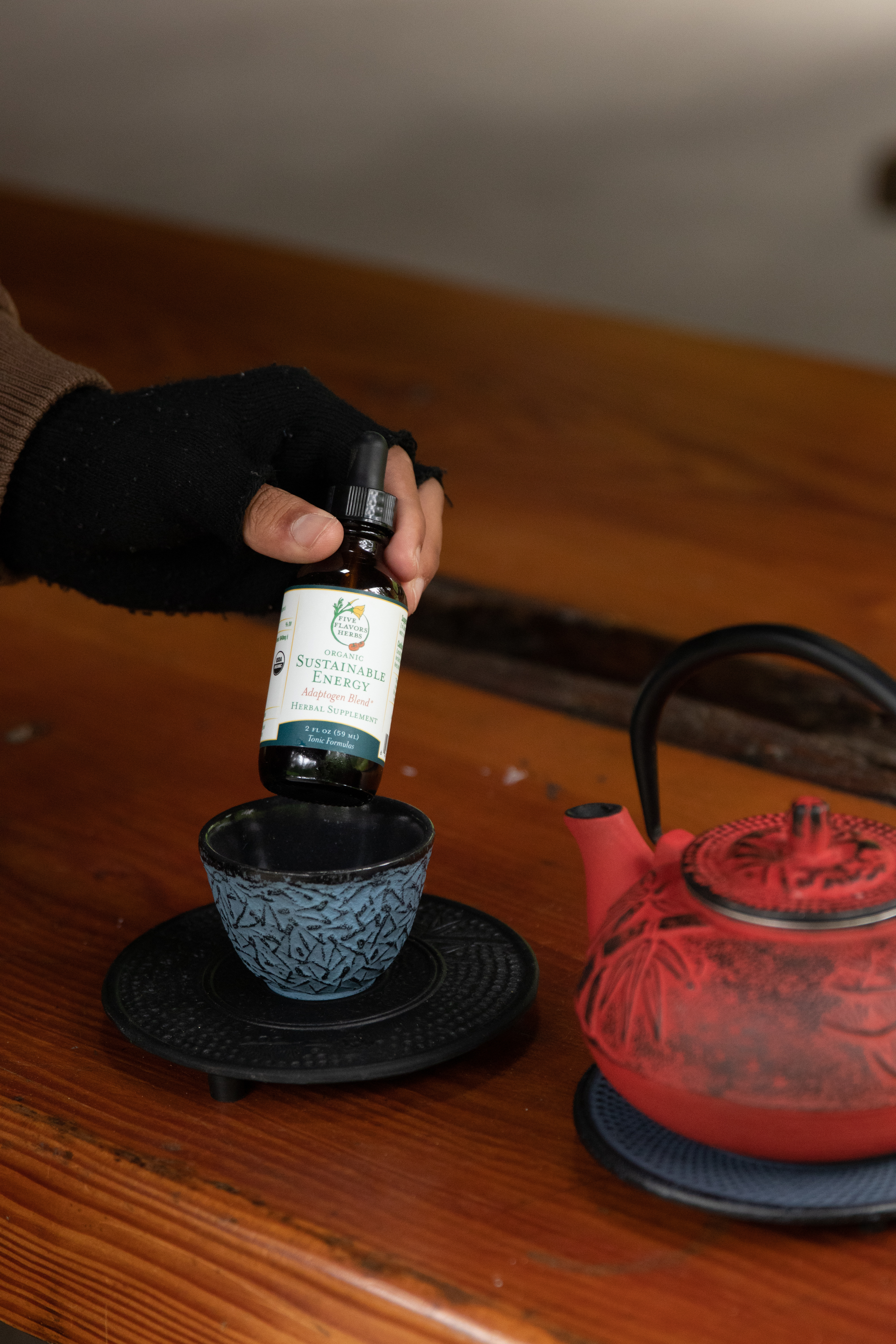
3. FOCUS
When there’s a lot to do, getting a little help with focus and concentration can go a long way. For adults wishing to avoid or minimize caffeine, nootropic herbs can help improve alertness without the jitters and the crash associated with stimulants.
- Gotu Kola: Widely researched for cognitive benefits, Gotu Kola also supports tissue healing and healthy circulation. Rich in triterpenoids and polyphenols, Gotu Kola is a deeply nourishing & healing tonic for skin, vascular and nervous system cells.
- Rosemary: One of the most familiar and accessible herbs in temperate and Mediterranean climates, rosemary is rich in anti-inflammatory compounds, and it’s spicy aromatic nature supports brisk circulation. These attributes benefit the nervous and vascular system for a quick pick-me-up and long-term support
- Schizandra: In TCM, Schizandra berries are in the “stabilize and bind” category. The fruit is said to represent all five flavors (it’s Chinese name wu wei zi means “five flavor seed”), and is included in many traditional formulas to tonify qi and calm the spirit, as well as to reduce sweating and support the lungs.
For kids (and many adults), gentle herbs like catnip can have profound benefits for focus, without any stimulant effect. Catnip makes a lovely tea, and grows easily in most gardens!

4. CALM
After a long day at school or work, it’s important to calm the mind and uplift the mood, so you can be kind to yourself and others. Kids, parents, and teachers are often exhausted at the end of the day! Including simple nervines into after school and work routines can help the entire family ease into a more relaxing evening and a better night’s sleep.
- Chamomile (Matricaria recutita): Across cultures, chamomile is used for enhancing relaxation and digestion
- Skullcap (Scutellaria lateriflora): Relaxes mental tension along with the muscles of the head, jaw and neck
- Passionflower (Passiflora incarnata): Helps to slow the monkey-mind churnings that keep us up at night.
- California poppy (Eschscholzia californica): Taken in small quantities, California poppy is one of our favorite herbs to “take the edge off” and is gentle enough for kids. Larger doses of our state bloom bring about drowsiness and physical comfort, without any opioid alkaloids.
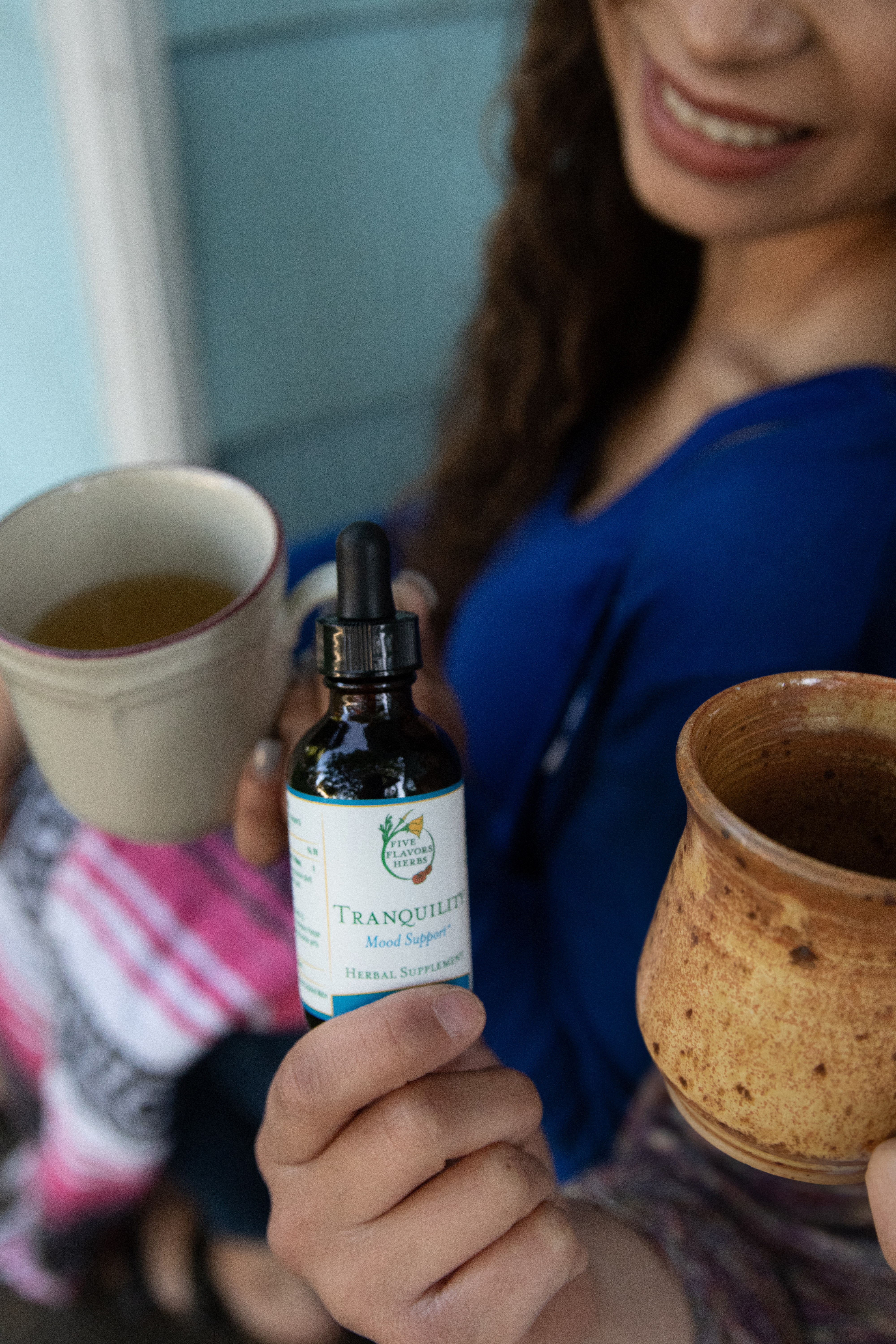
Final thoughts
We hope you feel more empowered to start the school year off with a toolkit full of herbal allies to use for mind & body support for the whole family!
Want to dig deeper? You may enjoy:
5 Productivity Tips: Herbs for Studying or Working at Home
Jade Wind Screen: Recipes for Respiratory and Immune Support

